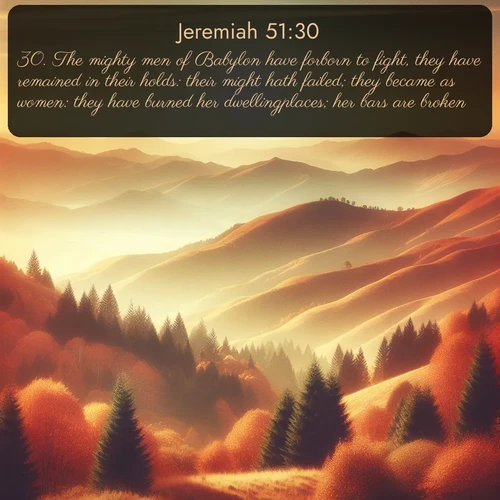Jeremiah 51:30 plusieurs versions / traductions
English Bible Translations
30. The mighty men of Babylon have forborn to fight, they have remained in their holds: their might hath failed; they became as women: they have burned her dwellingplaces; her bars are broken.
30. The mighty men of Babylon have forborne to fight, they remain in their strongholds; their might hath failed; they are become as women: her dwelling-places are set on fire; her bars are broken.
30. Babylon's men of war have kept back from the fight, waiting in their strong places; their strength has given way, they have become like women: her houses have been put on fire, her locks are broken.
30. The mighty men of Babylon have ceased to fight, they are sitting in the fortresses; their might hath failed, they are become as women: they have set her dwelling places on fire; her bars are broken.
30. The mighty men of Babylon have forborne to fight, they have remained in their holds: their might hath failed; they became as women: they have burned her dwelling-places; her bars are broken.
30. Ceased have the mighty of Babylon to fight, They have remained in strongholds, Failed hath their might, they have become woman, They have burnt her tabernacles, Broken have been her bars.
German Bible Translations
30. Die Helden zu Babel werden nicht zu Felde ziehen, sondern müssen in der Festung bleiben, ihre Stärke ist aus, sie sind Weiber geworden; ihre Wohnungen sind angesteckt und ihre Riegel zerbrochen.
30. Die Helden Babels stehen ab vom Kampfe, sie sitzen in ihren Burgen, ihre Kraft ist versiegt, sie sind zu Weibern geworden, ihre Wohnungen werden in Brand gesteckt, ihre Riegel zerbrochen!
French Bible Translations
30. Les guerriers de Babylone cessent de combattre, ils restent dans les forteresses. Leur courage s'est éteint, ils sont devenus comme des femmelettes. On a mis le feu aux habitations, on a brisé les verrous.
30. Les guerriers de Babylone cessent de combattre, Ils se tiennent dans les forteresses; Leur force est épuisée, ils sont comme des femmes. On met le feu aux habitations, On brise les barres.
30. Les guerriers de Babylone cessent de combattre, Ils se tiennent dans les forteresses; Leur force est épuisée, ils sont comme des femmes. On met le feu aux habitations, On brise les barres.
30. Les hommes forts de Babylone ont cessé de combattre, ils sont assis dans les places fortes; leur force est épuisée, ils sont comme des femmes; on a mis le feu à leurs demeures, leurs barres sont brisées.
30. Les hommes forts de Babylone ont cessé de combattre, ils se sont tenus dans les forteresses, leur force est éteinte, et ils sont devenus [comme] des femmes; on a brûlé ses demeures; et ses barres ont été rompues.
30. Les hommes vaillants de Babylone cessent de combattre, ils se tiennent dans les forteresses; leur force est épuisée; ils sont devenus comme des femmes. On a incendié ses demeures; les barres de ses portes sont brisées.
Versions with Strong Codes
Jeremiah 51 / KJV_Strong30.
Strong Code definitions
H1368 gibbowr ghib-bore' or (shortened) gibbor {ghib-bore'}; intensive from the same as H1397; powerful; by implication, warrior, tyrant:-- champion, chief, X excel, giant, man, mighty (man, one), strong (man), valiant man.see H1397
H894 Babel baw-bel' from H1101; confusion; Babel (i.e. Babylon), including Babylonia and the Babylonian empire:--Babel, Babylon. see H1101
H2308 chadal khaw-dal' a primitive root; properly, to be flabby, i.e. (by implication) desist; (figuratively) be lacking oridle:--cease, end, fall, forbear, forsake, leave (off), let alone, rest, be unoccupied, want.
H3898 lacham law-kham' a primitive root; to feed on; figuratively, to consume; by implication, to battle (as destruction):--devour, eat, X ever, fight(-ing), overcome, prevail, (make) war(-ring).
H3427 yashab yaw-shab' a primitive root; properly, to sit down (specifically as judge. in ambush, in quiet); by implication, to dwell, to remain; causatively, to settle, to marry:--(make to)abide(-ing), continue, (cause to, make to) dwell(-ing), ease self, endure, establish, X fail, habitation, haunt, (make to) inhabit(-ant), make to keep (house), lurking, X marry(-ing), (bring again to) place, remain, return, seat, set(- tle),(down-)sit(-down, still, -ting down, -ting (place) -uate), take, tarry.
H4679 mtsad mets-ad' or mtsad {mets-awd'}; or (feminine) mtsadah {mets-aw-daw'}; from H6679; a fastness (as a covert of ambush):--castle, fort, (strong) hold, munition.see H6679
H1369 gbuwrah gheb-oo-raw' feminine passive participle from the same as H1368; force (literally or figuratively); by implication, valor, victory:-- force, mastery, might, mighty (act, power), power, strength. see H1368
H5405 nashath naw-shath' a primitive root; properly, to eliminate, i.e. (intransitively) to dry up:--fail.
H1961 hayah haw-yaw a primitive root (compare 1933); to exist, i.e. be or become, come to pass (always emphatic, and not a mere copula or auxiliary):--beacon, X altogether, be(-come), accomplished, committed, like), break, cause, come (to pass), do, faint, fall, + follow, happen, X have, last, pertain, quit(one-)self, require, X use. see H1933
H802 'ishshah ish-shaw' feminine of H376 or 582; irregular plural, nashiym{naw-sheem'}; a woman (used in the same wide sense as H582):--(adulter)ess, each, every, female, X many, + none, one, + together, wife, woman. Often unexpressed in English. see H376see H582&volume=KJV_strong' target='_self' >H582 see H582&volume=KJV_strong' target='_self' >H582
H3341 yatsath yaw-tsath' a primitive root; to burn or set on fire; figuratively, to desolate:--burn (up), be desolate, set (on) fire ((fire)), kindle.
H4908 mishkan mish-kawn' from H7931; a residence (including a shepherd's hut, the lair of animals, figuratively, the grave; also the Temple); specifically, the Tabernacle (properly, its woodenwalls):--dwelleth, dwelling (place), habitation, tabernacle, tent.
H1280 briyach ber-ee'-akh from H1272; a bolt:--bar, fugitive. see H1272
H7665 shabar shaw-bar' a primitive root; to burst (literally or figuratively):--break (down, off, in pieces, up),broken((-hearted)), bring to the birth, crush, destroy, hurt, quench, X quite, tear, view (by mistake for H7663).see H7663
Prédications qui analysent les thèmes Jérémie 51
Thèmes : Destruction de Babylone; Jugement de Babylone; Rappel à IsraëlRelated Sermons discussing Jeremiah 51
Themes : Destruction de Babylone; Jugement de Babylone; Rappel à Israëlsee also: Bible Key Verses ; KJV Bible Images, BBE Bible images

